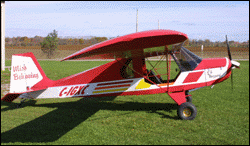Challenger reduction drive
advisories.
|
|
|
|
|
|
|
|
|
|
|
|
Click here for this months specials! |
|
|
 |
|
|
|
Challenger Reduction Drive
Advisory |
|
The standard reduction drive supplied on the
Challenger whether using a Rotax or Hirth engine is a belt drive system.
Many failures of this system have been reported by owners.
These include:
- Failure of the bolts
securing the drive to the engine.
- The belt drive system used on the Challenger
is secured by either 3 or 4 bolts depending on the year of the
aircraft. These bolts have been reported to come loose and/or fail. It
is suggested that when installing the bolts that BLUE LOCTITE be used
on the threads of the bolts, and that these bolts be an area of
regular inspection.
- Failure of the drive
housing.
- Owners have reported the belt drive housing
or the main body of the housing breaking from bolt hole to bolt hole.
It is suggested that this area be inspected regularly and at the first
sign of failure that the drive system be replaced.
- Failure of the drive
bearings and wear on the output shaft.
- The belt drive system on the Challenger uses
a group of bearings to support the upper output shaft. Many owners
have reported failure of these bearing inside the upper pulley. They
have also reported considerable wear on the shaft where the bearings
ride. An easy way to check for wear is to loosen the top adjuster off
lower the pulley, tighten the adjuster and nut back up, and with your
hands grab the prop check for up and down play. If play is evident the
bearings and shaft should be inspected.
- Failure of the drive
output shaft.
- Owners have reported failure output shaft at
the point where the adjuster bolt threads through the middle of the
shaft. If the shaft fails the top pulley and the prop will exit
rearwards, usually striking the horizontal stabilizer/elevator or
rudder. This of course will also cause loss of propulsion requiring an
emergency landing.
- Failure of the adjuster
bolt.
- Many owners of Challengers have reported
failure of the bolt used to adjust the drive belt tension. This
results in loss of propulsion to the propeller. This failure is a
result of improper tightening of the large retaining nut, or failure
of the locking mechanism on the nut. The proper tensioning procedure
is to:
- 1) Loosen the large locking nut.
- 2) Use the adjuster bolt to properly
tension the belts
- 3) SNUG up the large locking nut.
- 4) With the nut snug and the belts properly
tensioned, REMOVE the adjuster bolt, and then using a torque wrench
torque the nut to specification.
- 5) Reinsall and torque the adjuster bolt to
95 inch lbs.
- The spinning of the
lower pulley on the output shaft.
- Owners have reported the lower pulley
spinning on the crankshaft. This can be caused by improper torque on
the nut. Another cause can be loose or slipping belts which cause
excess heat to be generated. This in turn heats up the aluminum pulley
on the steel shaft.
- Failure of the bolts
securing the prop onto the reduction drive.
|
|
|
 |
|
|
|
|
|
Ultralight
News
By Appt. ONLY!
Airfield
|
|
|
|
Ultralight Aircraft News Web Magazine .
You may link to these pages or print
them out for your own personal use, but no part of this
publication may be copied or distributed, transmitted, transcribed,
stored in a retrieval system, or translated into any human or computer
language, in any form or by any means, electronic, mechanical,
manual, or otherwise, without the written permission of Ultralight News.
By copying or paraphrasing the intellectual
property on this site, you're automatically signing a binding contract
and agreeing to be billed $10,000 payable immediately. Copyright Ultralight News
|
|
Return
to Main Index for this section |
|
|

